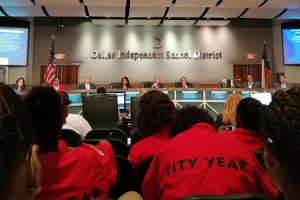
By Courtney Borchert, NDG Special Contributor
The Dallas Independent School District (Dallas ISD) Board of Trustees adopted the proposed 2017-2018 fiscal year budget on June 22, which leaves the district with approximately $53 million less in general funds. Board of Trustees President Dan Micciche noted that one influencing factor for the cut was due to decreased state funds.
“The district collected $87 million more in property tax revenue, and the state then saw that and reduced the revenue that it sends to the district by $97 million,” Micciche said.
The Foundation School Program establishes how much state funding school districts can receive based on factors like enrollment and local taxable property values. According to the Texas Education Agency, this approach is used to ensure districts have equal access to similar revenue per student at similar tax efforts. Dallas ISD served 156,474 total students for the 2016-2017 year and faced obstacles with declining enrollment. State funding contributions have been impacted since the program’s formula partially calculates funding on weighted average daily attendance.
“What needs to be understood is that we have fewer students, and we’re continuing to lose students,” Second-Vice President and District 6 Trustee Joyce Foreman said.
Residents addressed the board that evening with concerns about sustaining school competitiveness against charter schools and funding for programs such as collegiate academics, special education, Accelerating Campus Excellence and expansions made to pre-k.
The trustees voted 6-3 in May to make Dallas ISD a District of Innovation. This decision aims to allow the district flexibility in instructional innovation and strategic initiatives. The adopted budget does expand funding for curriculum development and instructional staff development by 21 percent, but many of the categories dealing with student wellness were cut.
“This budget cuts our critical services for guidance counselors, social and health support and co-curricular activities,” Eric Cowan of District 7 said.
A tax ratification election was proposed by 61 percent of the evening’s speakers to agenda items as a solution to matching costs of valued district resources. The maintenance and operations tax rate has remained $1.04 for the past 10 years and can legally only be raised to a maximum of $1.17 with voter support. Whitney Holman of District 5 is one resident that wants to see voters be given the power to decide if they want the 13 cent increase.
“As a former educator in Dallas ISD, when I hear about the $53 million budget cut, my mind cuts to faces of children and families, school communities, and livelihoods that will be affected,” Holman said. She believes families are eager to see students achieve at higher rates, and would be willing to financially invest more in the district to attract and retain talent. “I’ve seen the power and influence that a school community can have – full of counselors, librarians, rich resources for children and how those resources can impact a child individually and as a member of their community. These resources really support the development and success of children in some of the most at-risk schools in our district,” Holman said.
Dallas ISD trustees previously considered adding a tax ratification election in November 2016. The focus of the tax hike was to add funding for early childhood, early-college high schools, and strategic teacher compensation, but it did not receive the super-majority needed by the board to bring the option to the voters.
“What I think is that there are some trustees that have concerns about how more money would be distributed, concerns that more money will just mean more inequity for some DISD students who are already underserved, and that is a valid concern,” Brandi Watts of District 2 said.
The board passed the proposed budget unanimously after speaker comments, and at this time there is no scheduled tax ratification election. The next Dallas ISD board meeting will take place August 24 at 6 p.m. at the Dallas ISD administration building in the Ada L. Williams Auditorium. A live meeting webcast is also available.





How can the state just cut funds to Disd knowing we are being robbed by corruption of Sce funds for at risk schools?
What can we do by God to get needed resources for our inner city southern sector schools with high at risk enrollments?
This is how gerrymandering, voter id (jim crow) masked laws are slowly diminishing the civil rights gains that helped all poor people and not just minority’s
Our body politic has been seized by crooks on every side leaving a void of fair and needed resources. God , good Lord, how much can our system bear to be held hostage to the profiteers and redneck lobbyist that suck like vampires the bloodline of policies and programs of local and state institutions that were meant to aid the poor in our society.
What truly happens to a Dream deferred?
Mass protest, high crime, and overwhelming poverty that will negatively affect everyone everywhere throughout American society.